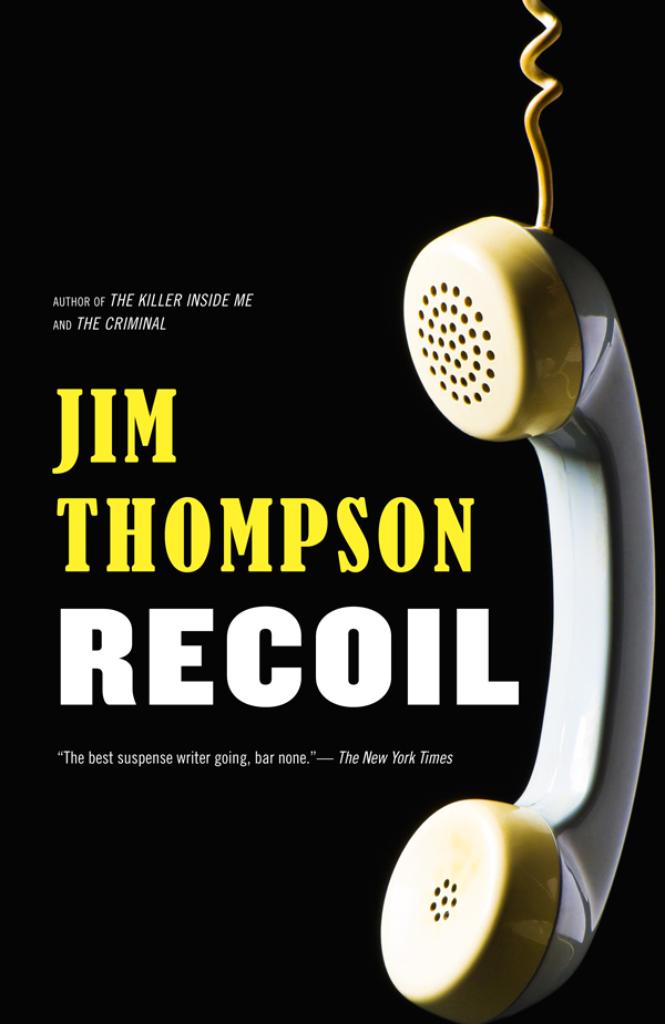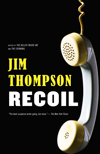Recoil
Authors: Jim Thompson


Jim Thompson

Little, Brown and Company
New York Boston London

All rights reserved. In accordance with the U.S. Copyright Act of 1976, the scanning, uploading, and electronic sharing of any part of this book without the permission of the publisher constitute unlawful piracy and theft of the author’s intellectual property. If you would like to use material from the book (other than for review purposes), prior written permission must be obtained by contacting the publisher at [email protected]. Thank you for your support of the author’s rights.
Q
uietly he tested the door of Lila’s bedroom and saw that it was locked; and then he went into his own room, leaving the door open to hear any movement of hers, and opened his briefcase.
He took the insurance policies from the briefcase, scanned them perfunctorily and slipped them into his inside coat pocket. They would go into the safety deposit box tomorrow.
He dipped into the briefcase again and drew out other papers. He studied them, frowning, with much of the disturbing feeling that he had for the insurance policies. With a grunt of irritation, he shuffled them into a kind of chronological order and began to read:
Luther Psychological Clinic
Capital & Lee Sts.
Capital City
Gentlemen:
This is a rather unusual application for employment. I hope you will read it to the end, and give it your earnest consideration.
I am thirty-three years old, a high school graduate, and, through reading and study, possess the equivalent of at least two years of college. I weigh one hundred and seventy pounds and am five feet eleven inches tall. Despite serious handicaps, I have kept myself in good physical condition. I am not familiar with your business, and do not know what type of job you might have at your disposal. But I will welcome the chance for any kind of work—within the state—and at whatever wage you care to pay.
For the past fifteen years I have been an inmate of this institution, serving a sentence of ten years to life for bank robbery. The crime was not one to be taken lightly, and I have not. But, in all humility, I cannot see that any good purpose is served in detaining me here longer.
I became eligible for parole approximately five years ago. Unfortunately, my parents had died and my only other relative, a married sister, was not and is not in a position to act in my behalf. I was, of course, too young to have formed business associations at the time of my commitment. As you doubtless know, a prospective parolee must have a job before he can be released; he must establish his ability to support himself. I am asking that you help me to do this.
May I please hear from you? On second thought, will you simply take action on my case with the parole board in the normal way of an interested party for an inmate? You can find out anything you wish to know about me from the board, and this will obviate any misunderstanding that might arise here from my writing you.
Very truly yours,
Patrick M. Cosgrove (No. 11587)
Librarian, Sandstone State Reformatory
Sandstone…
Luther thought he’d become accustomed to rottenness. Yet Sandstone never failed to outrage him. It wasn’t a prison. It was a madhouse in which the keeper, and not the inmates, was mad. There was only one way to survive there: to become tougher and more tortuous-minded than that keeper. If you did that—if you amused the man with the preternaturally brilliant eyes and the unpredictable laughter—you not only survived, but did so in comparative comfort.
But there could be no letting down. You might tire of the game, but the man never did. And when you tired or became careless…
Office of the Warden
Dr. Roland Luther
Capital & Lee Sts.
Capital City
In re, Pat “Airplane Red” Cosgrove
Dear Doc:
Sure was good to hear from you and wish I was right there in the big town with you. I always say you was one perfect host and know how to entertain a man and that was sure some time the last time me and you and them other fellows got together. Well, I was pretty hot when I got your letter and I was going to go right in and give that sob something to think about. But since you ask otherwise why that’s the way it is and hands off, and anyway I could not help laughing when I got to thinking about it. You know the Chief, my secretary. Well I know Chief got that letter and probly a hundred others out for him but just try and make them say so. I bet we could hang them both and they wouldn’t. I am a great admirer of loyalty and mind your business and know you are too. So you fix things up anyway you want but let me know how and I will play with you as far as I can. Just give me a ring when you are coming. I will close now as I am writing this myself instead of that sob chief and we will give them both a hell of a surprise.
Yr. obdt. frnd. & servt.,
Yancey Fish
P.S. Doc you know it is against the rules to bring whiskey into the prison and if I find a case or two on you I will have to confiskate it. Ha ha. Y.F.
Well, Fish hadn’t hanged them, but he had threatened them with everything else; and, while each had faced the harangue in his own way, the results had been identical.
The Chief, a full-blooded Indian serving three life sentences, had merely grinned insolently and made non-committal replies. The red-haired, blue-eyed Cosgrove had talked at length: polite, mildly humorous, insistently grammatical—and without saying anything. He would not turn on the man, the Chief, who had obviously helped him. No threat or bribe could make him.
He, Luther, had been a little troubled by Cosgrove’s patent intelligence. But still, he fitted specifications in every other detail, and he would be given nothing for that intelligence to work on.
To Yancey L. Fish
Warden, Sandstone State Reformatory
GREETINGS:
Whereas it appears you now have in your keeping one Patrick M. Cosgrove, and
Whereas the said Patrick M. Cosgrove has served fifteen years of an indeterminate sentence and has met certain other conditions by which he becomes eligible for parole, and
Whereas one Roland T. Luther, Ph.D., a citizen in good standing, has guaranteed employment for the said Patrick M. Cosgrove during the two years succeeding the date of this instrument, pledging moreover that he will in every way assist the said Cosgrove to a righteous manner of living,
Therefore Let It Be Known that Patrick M. Cosgrove is hereby paroled in the custody of Roland T. Luther for a period of two years, or until and/or unless it should become necessary to remand the said Cosgrove to his present place of incarceration.
Let it further be known that upon satisfactory completion of the aforementioned term of parole, the said Patrick M. Cosgrove is to be restored to full citizenship and all rights and privileges accruing thereto.
WITNESS OUR HAND AND SEAL.
Louis Clements Clay
Governor, and President (pro tem)
Board of Parole
Well, there it was; the beginning and the end of everything. And now that he had examined it item by item, he could not dispel the thought that it was both foolish and dangerous. If Hardesty had not been positive that it would work—but Hardesty had been positive. He was certain that under the circumstances they were creating, the insurance companies would have to pay, and pay promptly. That was Hardesty’s best legal advice, and Hardesty had never yet been wrong about a legal matter.
Well—Luther sighed and began to undress—it was done now. He wished that Cosgrove wasn’t such a likeable person, but that, unfortunately or otherwise, was necessary. There had to be some reason for getting him out of Sandstone.
He heard Lila’s door open, and he paused in the act of removing a shoe. She stopped in the hall, her fur coat over her arm.
“Couldn’t sleep, eh?” he said. “Well, I trust you’ve got something arranged. It’s a little late at night for a pick-up.”
She smiled weakly, apologetically. “After all, Doc, I
am
human.”
“Interesting,” he said, letting the shoe drop to the floor. “An interesting if debatable statement.”
“You—you don’t mind my going out?”
“I don’t care what you do.”
“I need some money, Doc.”
“I’ll get it for you in the morning.”
“I could take a check…”
“You,” he said, “can do exactly what you’re told. Exactly. Do you understand?”
“I understand,” she said, slowly. “Perfectly.”
I
t is five o’clock in the morning of my second day here, and I have been lying awake since one.
Excited and happy? I suppose. I suppose that, beneath this bleached mask which does duty as a face, I am still shouting with wonder and delight. But a man can only enjoy so much and then comes sleep.
I wish I had taken nothing to drink on the way here yesterday. I am positive—almost—that I said and did nothing out of the way. And, yet, of course, I cannot be absolutely positive.
I had nodded agreeably when he explained he never drank while driving; and I expressed my gratitude for his understanding of my need to “forget.” I drank without urging, and when about a third of the pint was gone, the questions began.
Why had I chosen him to write to? That was simple. The only periodicals we received in the prison were brag-books—“controlled circulation” publications issued for the purpose of squeezing money from individuals and firms who were doing, or hoped to do, business with the politicians in power. I had got his address from a complimentary advertisement in one of these. I had obtained the address of everyone else I appealed to in the same way.
Did I understand why he had put me through that rigamarole with Warden Fish? I was not prepared to question his actions, I said (and quite sincerely), but I believed I understood. He demanded absolute loyalty from his associates. He would have no use for a man who would abandon loyalty for expediency.
Did I have any close relatives or friends? No. I had a married sister who wrote me a brief note each Christmas. At her request, I did not reply. Our only tie was the accident of birth.
What had I read? Everything in the prison library, contributions to which seemed to have stopped about 1920. All of Shakespeare, Dickens, Swift, Twain, Addison and Steele, Rabelais, Schopenhauer, Marx, Scott, Jules Verne, Wilde, Cervantes, Machiavelli, the Rover Boy series, Lewis Carroll, the Bible, the…
As I talked, I adjusted the wind-wing on the window next to me until I picked up Dr. Luther’s reflection in its nickeled frame. He seemed well pleased with my replies, although, due to three slightly protruding upper teeth, the mere relaxation of his features sometimes gives him the appearance of smiling.
He is about fifty, I should judge, but here, again, it is hard to be certain. His hair is thin and sandy. He is considerably overweight for his height, which is something less than mine. His eyes bulge behind thick-lensed glasses. Add to that a soft voice which switches abruptly from the grammatical and precise to the slangy and vulgar—and you have a man whose age, like himself, is no matter for hasty estimation.
I went on talking and watching him as the miles sped by, knowing that my words were becoming blurred. Knowing, then not knowing…
When I awakened hours later, we were only about ten miles from the city, and the car was turning into a roadhouse near the edge of a large lake.
The establishment had apparently been pretty swank at one time, but that had been a long while ago. It was gone to seed now. We were the only patrons. Looking through the window, I could see why. What I thought was a lake was actually a river—a broad, sluggishly moving expanse of greasy sludge and mud and water; the waste from the city’s oil field.
Despite the tightly closed windows and the air-conditioning system, there was a faint and unpleasant smell of sulphur.
“A little present from the oil companies,” he said, with a sudden sour laugh. “They’ve taken a billion dollars out of this field, and they’re taking more every day. But they can’t afford to dispose of their sludge!”
I didn’t say anything, and he laughed again, the same way, staring down at his almost untouched food.
“I should talk,” he said, harshly. “Pat, I’m going to lay my cards on the table. Play straight. Tell you something you’d find out in the next twenty-four hours, anyway…”
“Yes, sir.”
“Call me Doc. Everyone does.”
“All right, Doc.”
“I’m a qualified psychologist, but I haven’t practiced in years. I can’t give you a job at the clinic because I haven’t any. It’s just a front for my lobbying. Grafting, in plain English.”
I gave him a straight, steady look. “You got me out of Sandstone, Doc,” I said. “That’s all I need to know about you.”
“Well—I’m not apologizing, of course. Hell, they didn’t call this state the heart of Balkan America for nothing. When it’s a choice of eat or be eaten, what’s a sensible man to do?”
“Eat,” I said.
He chuckled and made a feinting motion at my chin with his fist. “You’ll do, Pat. Now what I had in mind for you was a job with the state—something that won’t require any training. How would that suit you?”
“Anything you do will suit me fine,” I said. “But—”
“Yes?”
“How can I be of any use to you if I don’t work for you?”
“Why should you have to be of any use to me?” His voice was an angry snarl. “Isn’t it conceivable that I might want to help you unselfishly? Give you a break when no one else would?”
“I didn’t mean to offend you,” I said. “I merely hoped to do something in return for what you’ve done for me.”
“Well, skip it,” he said. “Maybe we ought to be getting out of here. Later than I thought it was.”
He drove slowly, glancing out at the curving river of mud, which, except for its smell, was gradually being lost in the darkness.
